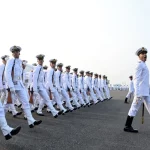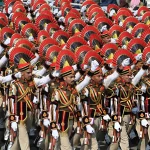A billboard erected in Karachi on May 27 has ignited fierce controversy, as it features images of Lashkar-e-Taiba (LeT) terrorist commanders alongside senior Pakistan Army generals. Displayed to commemorate Youm-e-Takbeer, the national day marking Pakistan’s 1998 nuclear tests, the billboard has raised concerns over the open celebration of a globally banned terrorist group alongside the country’s military leadership.
Situated in a prominent location in Karachi, the billboard bears the words “Youm-e-Takbeer” in bold Urdu, celebrating Pakistan’s nuclear capabilities. While the occasion is traditionally associated with national pride and strategic deterrence against India, the inclusion of LeT leaders—implicated in some of the deadliest terrorist attacks in South Asia, including the 2008 Mumbai attacks—has drawn sharp criticism both within Pakistan and internationally.
The timing of this display comes amid strained India-Pakistan relations following a deadly attack in Indian-administered Kashmir earlier this year, which killed 26 Hindu tourists. India has blamed Pakistan-based groups for the assault, further escalating regional tensions. The billboard’s appearance, juxtaposing LeT figures with Pakistan Army generals, reinforces longstanding allegations that groups like LeT operate as strategic proxies under military patronage, particularly in the Kashmir conflict.
General Syed Asim Munir, Pakistan’s Field Marshal, had earlier courted controversy during a February 2025 speech marking Kashmir Solidarity Day, where he declared Pakistan was ready to fight “10 more wars” over Kashmir. This latest display appears to lend symbolic support to such statements, indicating a continued alignment between militant narratives and state-backed nationalism.
LeT, founded in the 1980s by Hafiz Saeed, has been designated a terrorist organization by the United Nations, the United States, India, and several other nations. It has been repeatedly accused of receiving logistical and financial support from Pakistan’s Inter-Services Intelligence (ISI), despite Islamabad’s official denials. The public celebration of its commanders as part of a national commemorative event suggests a defiant disregard for international norms on counterterrorism.
Youm-e-Takbeer marks the anniversary of Pakistan’s nuclear tests conducted on May 28, 1998, in Chagai, Balochistan, which made it the seventh nuclear power in the world. While the day holds patriotic significance, critics argue that associating it with terrorist figures severely undermines Pakistan’s global image and obligations.
The billboard has triggered demands for Pakistan’s actions to be reviewed by international oversight bodies. The United Nations and the Financial Action Task Force (FATF) have long pressured Islamabad to sever ties with extremist groups and fully comply with global anti-terrorism measures. The incident may prompt renewed scrutiny, especially as Pakistan attempts to avoid reclassification or sanctions under the FATF’s grey list framework.
As the debate unfolds, the Karachi billboard stands as a symbol of the persistent entanglement of militancy and statecraft in Pakistan, a dynamic that continues to cast a long shadow over peace and stability in South Asia.













